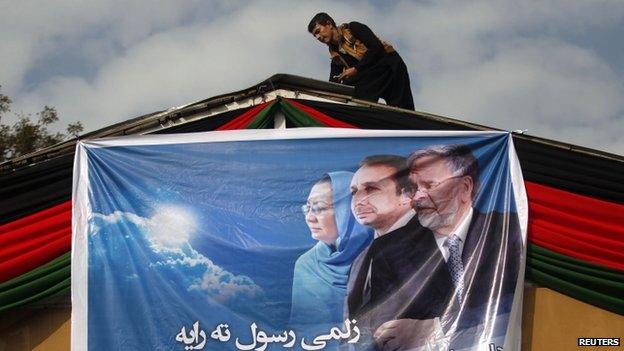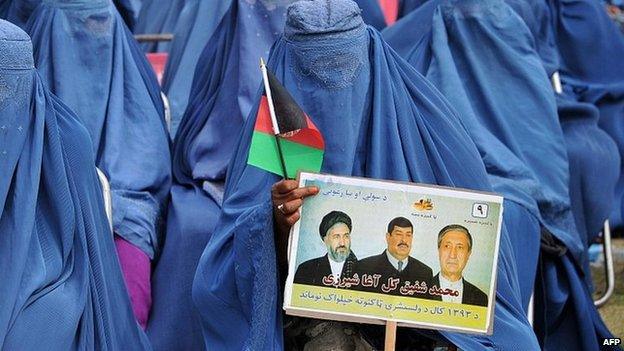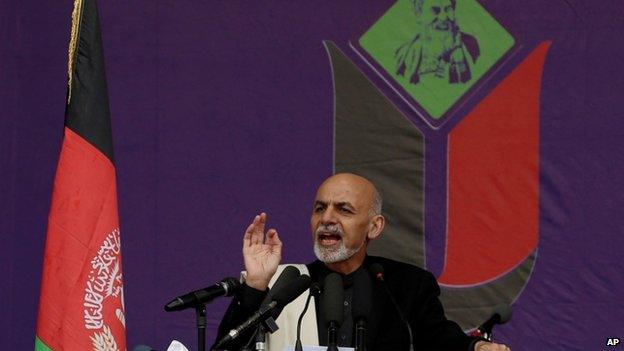Untimely death blows Afghan election wide open
- Published

Presidential hopeful Zalmai Rassoul is Hamid Karzai's favoured candidate
When US General Joseph Dunford, the senior coalition commander in Afghanistan, addressed the Senate Armed Services Committee on 12 March, he spoke largely to the four walls and empty seats in a room that once used to be packed with journalists, diplomats and academics analysing every twist of US policy in Afghanistan.
The empty room illustrated how Afghanistan has disappeared from the top of the agenda of US and European policy makers and public and media consciousness.
However, in a few weeks, Afghans go to the polls to elect a new president. A fraud-free election and a peaceful political transition from President Hamid Karzai to a new president, accepted by the majority of the people, will ultimately matter far more for the future stability of Afghanistan and the region than speculation about the US troop withdrawal or the machinations of the Taliban.
Yet critically, even after thousands of dead and $1 trillion (£602bn) spent, no-one has a clue as to the outcome of the elections or what will happen next.
A series of recent events has left Afghans and the international community even more uncertain as to the outcome of the elections on 5 April and whether they will be free and fair.
The untimely death of Vice-President Marshal Mohammed Fahim has left a huge vacuum in Mr Karzai's plans to get his favoured candidate - the former Pashtun national security adviser Zalmai Rassoul - elected.
As the leader of the powerful Panjsheri Tajiks and the designated leader of the former Shura-e Nezar or what used to be called the Northern Alliance made up of all the non-Pashtun ethnic groups and warlords, Mr Fahim's powers of wheeling and dealing with those groups were vital to Mr Karzai's plans.
Mr Karzai needs to appoint a successor quickly who has to be a Tajik, or the leading opposition candidate Abdullah Abdullah - who commands the partial support of the Northern Alliance vote bank and is ahead in the polls - could become the undisputed leader of both the Tajiks and all non-Pashtuns.
The half Tajik, half Pashtun Mr Abdullah viewed Mr Fahim as an incompetent and scheming rival - the two never got on - but Mr Abdullah now has everything to gain from the leadership vacuum that his death has created.
It suits Mr Abdullah that Mr Karzai delays any appointment of a new vice-president, so that Mr Abdullah can consolidate his vote bank in the former Northern Alliance.
Secondly, Mr Karzai's attempts to support Zalmai Rassoul as the leading - and his favoured - Pashtun candidate is not working out.
Mr Karzai's strategy has always been to get all the Pashtun candidates to support his single choice by getting other Pashtun candidates to stand down at the right moment in favour of Mr Rassoul. That would ensure a formidable vote bank against Mr Abdullah.
However, it took Mr Karzai far too long to get his brother Qayuum Karzai to stand down as a candidate and support Mr Rassoul. Now Mr Karzai has left it too late to get other Pashtun candidates, such as the fundamentalist Abdul Rasul Sayyaf and the warlord Gul Agha Sherzai, to do the same.
Vote 'rigging'
These candidates may now calculate that they can get a better deal from whoever becomes the next president than from Mr Karzai's candidate who may lose.

These Afghan women attended an election rally of Afghan presidential candidate Gul Agha Sherzai in Jalalabad

Ashraf Ghani is now considered the leading Pashtun candidate
Moreover, the leading Mr Pashtun candidate now is not Mr Rassoul, but Ashraf Ghani, a well known technocrat who has been in and out of government since 2001 and is popular with the youth vote, but is someone whom Mr Karzai has never liked nor trusted and is unlikely to endorse.
According to polling undertaken by Tolo TV, Mr Ghani is trailing just behind Mr Abdullah, with Mr Rassoul a distant third. Mr Ghani's strategy is now to muster support and the vote banks from the very same Pashtun candidates that Mr Karzai is trying to swing to his side.
The greatest danger is the fear of rigging by Mr Karzai's supporters, who control the government machinery. Alleged ballot box stuffing by Mr Karzai's supporters in his 2009 re-election nearly led to civil war between Mr Karzai and Mr Abdullah.
Unfortunately, the reasons for rigging then are still present today. Back in 2009, Mr Karzai feared that the Pashtun vote bank would not turn out on election day due to Taliban threats and intimidation.
That proved true, as very few Pashtuns in the south and east actually did turn out. Instead, the government was accused of carrying out massive ballot box stuffing of Pashtun votes that made it appear that millions of Pashtuns had voted and gave Mr Karzai an undisputed advantage against Mr Abdullah.
Today, the Taliban are once again threatening death to anyone who takes part in the elections. They can most safely carry out such threats in the south and the east - the Pashtun belt - rather than in the north and west where Mr Abdullah will carry most votes.
Thus to defeat Ashraf Ghani in the first round and ensure Zalmai Rassoul becomes the leading Pashtun candidate for the second round of polling in June, the Pashtun turnout has to be large and decisive. That can only be assured by more vote rigging by government supporters, Mr Karzai's opponents say.
The hasty departure of Western troops, the major reduction of any electoral role for the United Nations by the international community, the unwillingness of any global body to carry out serious monitoring of the polls and the overall lack of international attention to the polls are likely to help create another constitutional crisis.
Tragically for Afghans, the West is already washing its hands of the polls.
If there is rigging, the losing candidates will unite against the government and Kabul.
Many Afghans are not willing to tolerate another fraudulent election. The need for a free and fair election is paramount for the country and the region.
- Published9 March 2014
- Published6 March 2014
- Published7 October 2013